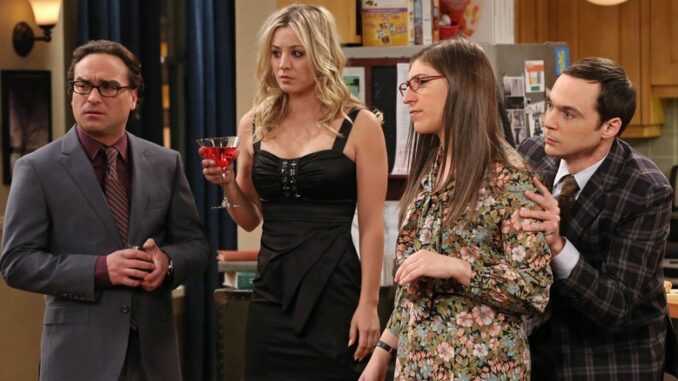
While many episodes of The Big Bang Theory have not aged well, the show’s most problematic outing is easily the worst in this regard. By the time The Big Bang Theory’s finale aired, it was clear that the appeal of the series could never be replicated verbatim. Like so many hang-out shows, the sitcom captured a unique cultural moment.
It would be impossible to imagine a version of Friends that doesn’t take place in ‘90s New York, or a version of How I Met Your Mother that doesn’t take place in the very different New York of the 2000s. Both shows are steeped in the pop culture of their respective eras, as the creators of How I Met Your Father discovered.
Similarly, The Big Bang Theory’s secret weapon can never be replicated, since a big part of its success came from the novelty of seeing nerds star in a sitcom. At the time, it was rare to see characters with nerdy interests as the protagonists of a series. Typically, they were relegated to the role of supporting stars.
In contrast, The Big Bang Theory celebrated the gang’s love of comics, tabletop board games, and fantasy. However, by the time the show ended, Game of Thrones was the biggest TV show in the world, the Marvel Cinematic Universe was the biggest movie franchise ever, and Star Wars was spawning countless TV shows and movie spinoffs. Nerds were now mainstream.
“The Killer Robot Instability” Saw Penny Call Out Howard’s Sexism
Penny Told Howard His Behavior Would Result In Continued Romantic Failure
Although the normalization of nerd culture was a huge part of the reason that The Big Bang Theory’s novelty factor wore off, there was always another, more insidious issue at play. Many of the show’s central romantic relationships rely on tropes that are at best outdated and at worst actively toxic, from Leonard’s nice guy act to Howard’s sleazy come-ons.
To be fair, plenty of sitcom characters before and after The Big Bang Theory were much more morally dubious than the Pasadena gang. Seinfeld and its R-rated spiritual successor, It’s Always Sunny In Philadelphia, both invited viewers to laugh at the antics of amoral characters who, on occasion, committed actual crimes and got away with them.
Even How I Met Your Mother’s Barney once made reference to selling a woman in a throwaway gag that plays very differently a decade and a half later. The difference is that those shows rarely posited their main characters as relatable, lovable heroes, whereas The Big Bang Theory usually sided with Leonard, Howard, Raj, and even Sheldon.
Barney was more sympathetic than Seinfeld’s antiheroes, but he was still a somewhat pathetic figure whose womanizing was a comically transparent attempt to ignore deep unhappiness. In contrast, because Howard and Leonard failed to woo women, the desperate measures they resorted to were written off as harmless comedic mishaps.
Howard using a drone to spy on the America’s Next Top Model house, or gifting Penny a teddy bear with a camera hidden inside, were both throwaway gags that were intended to illustrate his pathetic desperation, rather than something more sinister. This came to a head in season 2, episode 12, “The Killer Robot Instability,” the show’s most problematic outing.

The Big Bang Theory Season 2 Episode 12’s Howard/Penny Story Aged Terribly
Penny Ends Up Apologizing To Howard Over Calling Out His Toxic Behavior
Early on in “The Killer Robot Instability,” Penny chews out Howard over his umpteenth sleazy chat-up line, but he reassures the rest of the group that they are simply flirting. Horrified to realize Howard sincerely believed this since The Big Bang Theory’s pilot, Penny disabuses him of the notion by explaining that she would never see him as a romantic prospect.
Penny explains to Howard that his behavior turns her off ever liking him romantically, which is pretty understandable considering said behavior consisted of constantly harassing her about dating him, making lewd comments about her appearance, and objectifying other women. It’s a fair reaction and one that might have prompted Howard to change his actions in another show.
Instead, the rest of the group expects Penny to apologize to Howard, despite his constant harassment of her, because his feelings were hurt. When Penny eventually acquiesces and tells Howard that he isn’t an inherently bad person, but he really needs to stop trying to act like a lothario, he tries to kiss her the moment she’s nice to him.
To be fair to the series, Penny does then break his nose while trying to stop him. Nonetheless, “The Killer Robot Instability” still ends with Howard announcing that he is “Halfway to pity sex” by his estimate. While the best episodes of The Big Bang Theory bridged the considerable gap between the gang and Penny, this outing felt drastically short.
It is only Penny who is expected to change her behavior, and Howard’s return to objectifying her and making his usual lewd comments is portrayed as a comedic triumph for the character. In a show that took a dimmer view of its antiheroes, this could have been effective satire. However, viewers were pushed to root for The Big Bang Theory’s nerds.
“The Killer Robot Instability” Highlights The Big Bang Theory’s Biggest Problem
The Sitcom’s Heroes Weren’t Always As Sympathetic As The Show Thought
From the pilot onwards, Raj, Howard, Sheldon, and Leonard were portrayed as inherently sympathetic thanks to their social isolation during childhood and adolescence. To be fair, the best episode of Young Sheldon did effectively prove that growing up with Sheldon’s unique brain was both a blessing and a curse.
However, the idea that these wealthy, gainfully employed, highly educated scientists were hard done by because of their romantic struggles is a tougher pill to swallow on a re-watch, and the idea that Penny should have apologized for calling out Howard’s behavior is particularly problematic. Thus, this episode of The Big Bang Theory truly aged terribly.
